2 - Ireland
Summary
Within Ireland a variety of competing amateur military traditions can be identified. One of the major ones, especially in the 1860s, is what could be termed the Fenian or Republican tradition formed from those opposed to British rule in Ireland and bearing, in its social composition and social activities, a number of similarities to the Rifle Volunteer movement in Britain. However, as this volume is concerned with the British Imperial manifestations of the amateur military tradition, the Fenian movement will not form a major part of this study. Within auxiliary crown forces raised in Ireland two competing amateur military traditions can be identified. The first and possibly oldest is the Protestant volunteering tradition. This can be traced back to the plantations of the late sixteenth and early seventeenth centuries and later manifested itself in the Irish Volunteers (1775–92), the Irish Yeomanry (1796–1834), the Ulster Volunteer Force (1913–14) and arguably even in the Ulster Special Constabulary (1920–70) and Ulster Defence Regiment (1970–92). As with the volunteer tradition in Great Britain the origin of these forces lay in local initiatives and considerable private funding. The other loyal auxiliary tradition in Ireland is that of the militia, essentially an attempt to transplant an English military system into Ireland. Although some early examples of this have been identified in the late seventeenth century, it was to be 1793 before this system was fully implemented in Ireland on an English pattern. Interestingly this thirty-six years after the same system had been implemented in England and Wales but four years before it was implemented in Scotland.
1837 found Ireland with no amateur military forces in proper existence. The Irish Yeomanry, formed in 1796 had been disbanded in 1834 by the Whig government. The force was widely seen to be sectarian in nature and was certainly largely Protestant in composition. In any case, its functions as a part-time constabulary force had been rendered redundant both by the concentration of the yeomanry in Ulster, far removed from some of the worst ‘disturbed districts’, and the formation of the Irish Constabulary in 1822.
- Type
- Chapter
- Information
- Citizen Soldiers and the British Empire, 1837–1902 , pp. 41 - 56Publisher: Pickering & ChattoFirst published in: 2014



